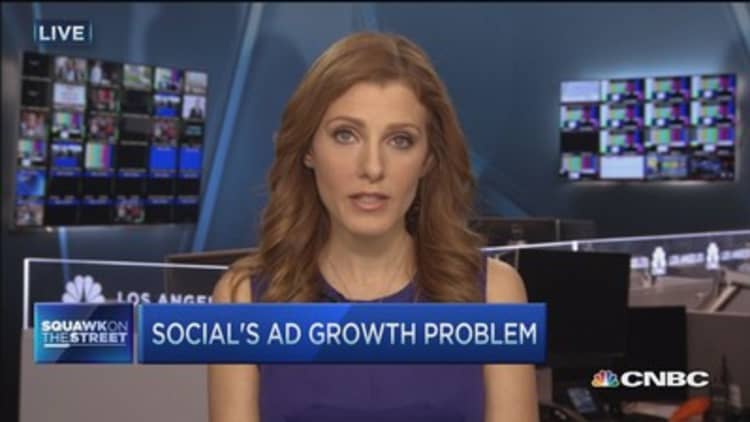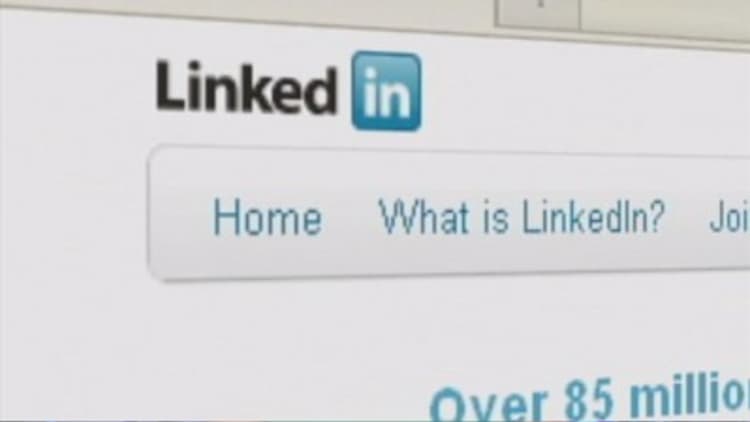
Investors seem to be re-evaluating their expectations that social darlings can keep up their growth. Friday marked LinkedIn's worst day ever as a public company, with its stock trading down more than 20 percent. And it's one of three social media companies whose shares have dropped by nearly a quarter this week on disappointing outlooks.
It's been three days of three social giants struggling. LinkedIn was clobbered by weak guidance for the second quarter and the year. On Thursday, Yelp tanked more than 23 percent on disappointing guidance. And Wednesday, Twitter shares fell to their lowest level since January as it warned that some of its ad products aren't—and won't—generate revenue as quickly as hoped.
These dramatic stock declines are sparking talk of a top, and raising questions of what this could mean for social companies in the IPO pipeline.

And of course, a lot of this chatter is happening on Twitter. Venture capitalist Chi-Hua Chien tweeted about those three stocks declining more than 20 percent, asking in a tweet, "Is this the start of a market correction in tech?"
Investor and Google analytics expert Adam Singer tweeted this on the heels of LinkedIn's earnings report:
Singer was referring to anonymous social app Secret shutting down. The company raised $35 million in three rounds from 26 investors, including big names like Kleiner Perkins, Google Ventures and SV Angel. The fact that the company is shuttering, rather than say selling to an Internet giant, does not bode well for start-ups without a clear revenue model.
The social giant that seems immune from growth concerns is Facebook. Why? Its user base is simply massive—1.44 billion people use its core product every month, 936 million every day. And the user numbers of its portfolio of apps continue to grow dramatically—WhatsApp has 700 million monthly active users, Messenger has 600 million monthly active users and Instagram has more than 300 million. Plus, Facebook's been able to grow ad revenue thanks to new ad measurement and products like video ads, which are growing engagement and ad dollars.
But even Facebook, which reported that its results were impacted negatively by foreign exchange rates, has seen its shares sink about 5 percent since it reported results about a week and a half ago.
Excepting Facebook, which many say is stealing the heat—and ad dollars—from some of the other companies, one challenge we're hearing a lot about this week is the challenge of accelerating advertising growth.
Read MoreHow Nielsen measures Twitter TV audiences
For LinkedIn, advertising is just one of three parts of its business—and comprises just 40 percent of its revenue. The business network grew ad revenue 38 percent to $119 million in the first quarter, but the company warned about weak ad sales in Europe and spoke about headwinds for traditional display ads. The problem: As advertisers shift toward "programmatic," or automated ad buying, they see less potential upside. "Going forward, display will remain an important component of our product suite, albeit with lessening impact on the business," Chief Financial Officer Steve Sordello said on the company's earnings call.
Twitter talked about challenges in getting marketers on board for some new ad formats designed to get viewers to buy an app or a product. "It's still early days for these products," CEO Dick Costolo said in the company's earnings release. "We have a strong pipeline that we believe will drive increased value for direct response advertisers in the future."
And Yelp reported decelerating ad sales growth in the first quarter. While ad revenue grew 51 percent over the year-earlier quarter, it declined from the prior quarter as a result of a restructuring of its sales force. "Brand advertising was $6.6 million, down 11 percent year over year. We have experienced industry headwinds related to the shift to programmatic advertising and the industry's desire to have advertising products that are disruptive to the consumer experience," CEO Jeremy Stoppelman said in the company's earnings call. "Given our focus on the consumer, we don't generally support those types of ad products."
Despite the common thread of advertising challenges, analysts point out that LinkedIn, Yelp and Twitter are each quite different; each has its own strengths, and issues.


